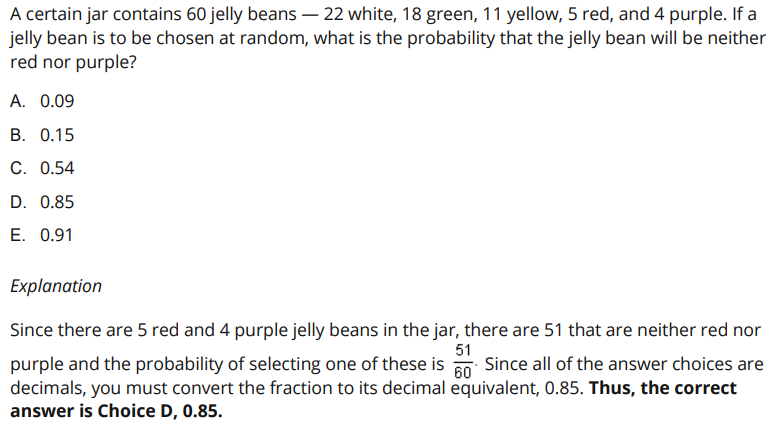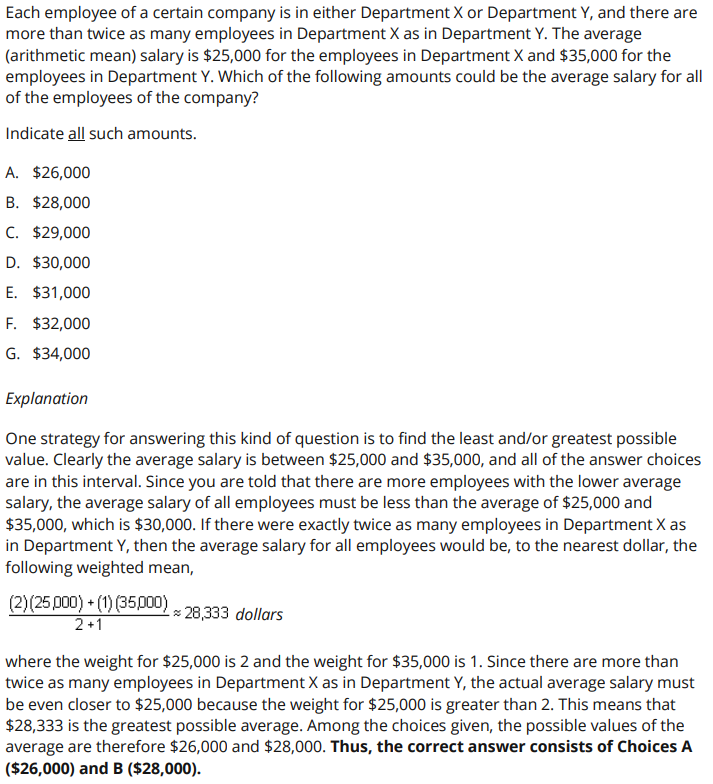The GRE (Graduate Record Examination) is more than just a test—it’s a crucial step toward your graduate or business school dreams. Each year, over 700,000 people take the GRE, making it one of the most widely recognized exams for higher education admissions. Among the various question formats on the test, multiple-choice questions—specifically Single-Choice Multiple-Choice (SCMC) and Multiple-Answer Multiple-Choice (MAMC)—are key to achieving a top score. Mastering these formats can make a world of difference in your performance, helping you navigate the test with confidence and ease.
In the GRE, you’ll encounter multiple-choice questions primarily in the Verbal and Quantitative Reasoning sections. Together, these sections feature 40 multiple-choice questions—20 in each—making them a major part of your score. Mastering both SCMC and MAMC question types is essential because they account for about 40% of your total score. This makes it crucial to tackle these questions strategically and with care to give yourself the best chance at success.
Explanation of SCMC and MAMC Formats
SCMC (Single-Choice Multiple-Choice): These questions offer five possible answers, but only one is correct. Around 60-70% of the multiple-choice questions you’ll encounter are in this format. They require you to focus on the question and thoughtfully eliminate incorrect answers to find the right one. With practice, you can learn to spot the correct choice more easily.

MAMC (Multiple-Answer Multiple-Choice): These are a bit trickier. Instead of just one right answer, there are two or more correct options. Representing about 20-30% of the multiple-choice questions, MAMC questions require a more in-depth understanding of the material and careful consideration of each option. The challenge here is making sure you select every correct answer without assuming anything about the number of correct choices.

Importance of Mastering These Question Types
These question types make up nearly 40% of your total GRE score. So, a solid strategy for answering these questions can really help boost your performance and bring you closer to your target score. Time is tight on the GRE. On average, you’ll have about one minute per question in the Verbal and Quantitative sections. Being quick and accurate with SCMC and MAMC questions can save you valuable time to focus on other parts of the test. These questions don’t just test your memory—they assess your ability to think critically, analyse multiple options, and spot the smallest differences in answers. According to a study by ETS, test-takers who excel at these question formats tend to score higher across the board, as they’ve honed their reasoning skills.
By practicing these question formats and understanding the strategies for tackling them, you'll not only improve your chances of getting the right answers but also boost your overall test-taking strategy. With confidence, careful preparation, and a solid grasp of these question types, you’ll be ready to face the GRE head-on and achieve your best possible score.
Understanding Single-Choice Multiple-Choice (SCMC) Questions
Definition and Format
Single-Choice Multiple-Choice (SCMC) questions are the classic multiple-choice questions you’ve been answering since school. They appear in both the Verbal and Quantitative sections of the GRE and always follow a simple rule: five answer choices, but only one is correct.
What makes these questions tricky is how the GRE designs the answer choices. There’s usually one option that’s clearly wrong, two that are somewhat plausible but not quite right, one that looks almost correct but contains a subtle trap, and then—the golden ticket—the one correct answer. Your job is to find it while avoiding the cleverly placed distractions.
SCMC questions are formatted with ovals next to each option, distinguishing them from Multiple-Answer Multiple-Choice (MAMC) questions, which use checkboxes. If you see an oval, you know that only one answer is right—no second guessing!
Common Pitfalls
Misreading the question – Sometimes, a single word like “except” or “not” can flip the entire meaning of the question. The GRE loves throwing in these curveballs, and if you’re not paying attention, you might pick the exact answer you were supposed to avoid.
Overlooking key details – Many wrong answer choices are designed to almost be correct. Maybe they contain an extra detail that slightly changes the meaning, or they answer a different question than the one being asked. If you rush, you might fall for the bait.
Rushing through options – Many test-takers pick the first answer that looks good without carefully reading the rest. This is exactly what the GRE hopes you’ll do. There’s always a chance that a later option is actually the better choice.
Strategies for Success
Read the question carefully – Before even glancing at the answer choices, make sure you fully understand what’s being asked. If it helps, rephrase the question in your own words.
Use the process of elimination – If you can confidently rule out even two options, you’ve significantly increased your chances of picking the right answer. The GRE often includes at least one completely unreasonable choice—eliminate it immediately.
Manage your time wisely – You should aim to spend 60 to 90 seconds on each SCMC question. If you get stuck, don’t linger too long. Mark it and return to it later.
Trust your logic – The GRE isn’t testing your ability to memorize facts but rather your ability to think critically. Instead of trying to over analyse the question, ask yourself, “What makes the most sense?” Often, a logical approach will lead you to the right answer.
SCMC questions might seem simple on the surface, but they require careful reading and strong reasoning skills. With enough practice, you’ll learn how to spot the traps, eliminate wrong answers efficiently, and confidently pick the correct choice—helping you inch closer to that high GRE score.
Understanding Multiple-Answer Multiple-Choice (MAMC) Questions
Definition and Format
Multiple-Answer Multiple-Choice (MAMC) questions are a step up from the standard multiple-choice format. Unlike Single-Choice Multiple-Choice (SCMC) questions, these don’t let you off easy with just one correct answer. Instead, you may have to select two or more correct responses from the given choices—and here’s the kicker: you only get credit if you select all the right answers. If you miss even one, you get zero points. No partial credit, no close-enough points.
These questions can appear in both the Verbal and Quantitative sections of the GRE, and they are identified by squares (☐) next to each option, rather than the ovals (○) used in SCMC questions. The squares indicate that you can—and must—select multiple answers. Some questions may tell you exactly how many correct answers there are, while others leave it up to you to figure it out. That’s part of the challenge.
Common Pitfalls
Assuming there’s only one correct answer – If you’re used to standard multiple-choice questions, it’s easy to fall into the habit of selecting just one answer. But on an MAMC question, stopping too soon could mean missing another correct option.
Partial selection leading to no credit – The GRE doesn’t reward half-right answers. If there are three correct choices and you pick only two, that’s a zero for the entire question. It’s all or nothing, so you have to be confident in your selections.
Not considering all options carefully – The test often includes answer choices that seem plausible but are slightly off. If you rush and pick the first few that look right, you might overlook another valid answer or, worse, include an incorrect one that negates your whole response.
Strategies for Success
Evaluate each option separately – Instead of trying to compare all the answers at once, treat each option as a stand-alone true-or-false statement. Ask yourself, “Does this option definitely answer the question?” If not, eliminate it.
Remember that there could be one or multiple correct answers – Just because it’s an MAMC question doesn’t mean there are necessarily many right choices. Some questions might have only two correct answers, while others have three or more. Don’t pick extra choices just because it feels right—be sure.
Don’t assume anything about the number of correct answers – If the question doesn’t specify how many correct responses exist, go through each answer choice carefully. The GRE won’t try to trick you into selecting too many or too few—but it will punish careless guessing.
Stay confident and don’t overthink it – Second-guessing can be your worst enemy. If you’ve logically determined that a choice is correct, trust yourself and move on. Dwelling on one question for too long can eat up valuable time.
MAMC questions require patience, logic, and a sharp eye for detail. With enough practice, you’ll develop an instinct for spotting multiple correct answers, avoiding common traps, and maximizing your score. The GRE rewards careful thinkers, so take your time, apply these strategies, and you’ll be well on your way to acing these tricky questions.
General Preparation Tips
Mastering GRE multiple-choice questions—whether Single-Choice (SCMC) or Multiple-Answer (MAMC)—requires a combination of consistent practice, careful review, and effective time management. Here are some key strategies to help you prepare efficiently and improve your overall score.
1. Practice Regularly
Regular practice is the foundation of GRE success. The more you expose yourself to real GRE-style questions, the better you'll become at recognizing patterns and avoiding common traps.
✔ Utilize Official GRE Practice Materials – The Educational Testing Service (ETS), which administers the GRE, offers free and paid official practice tests. These materials closely resemble actual exam questions and are the best resources for preparation.
✔ Engage with Sample Questions – Work through practice sets for both Verbal and Quantitative Reasoning to familiarize yourself with different question types, including tricky SCMC and MAMC formats.
✔ Simulate Test Conditions – Practice in a quiet, timed environment to get used to the pressure of the real test.
2. Review and Analyse
Practicing without reviewing your mistakes won’t lead to meaningful improvement. A structured review process can help you identify weak spots and develop strategies to fix them.
✔ Assess Your Performance – After every practice session, analyze your correct and incorrect answers. Don’t just focus on what you got wrong—also review correct answers to reinforce your understanding.
✔ Identify Patterns in Mistakes – Are you frequently misreading questions? Struggling with certain concepts? Noticing repeated errors can help you pinpoint areas that need extra attention.
✔ Focus on Areas Needing Improvement – If you consistently struggle with certain types of questions (e.g., algebra-based SCMC questions or inference-based MAMC questions), dedicate more study time to those areas.
3. Time Management
The GRE is as much about time management as it is about knowledge. Learning how to pace yourself can help you maximize your score.
Here’s a simple table to present the time allocation for each question type:
| Question Type | Recommended Time per Question | Reasoning |
|---|---|---|
| SCMC (Single-Choice Multiple-Choice) | ~60 seconds | Only one correct answer; requires quick elimination and selection. |
| MAMC (Multiple-Answer Multiple-Choice) | ~90 seconds | Requires evaluating multiple answer choices carefully to select all correct ones. |
This breakdown ensures you stay on track during the test while allowing enough time to think through each question properly.
✔ Practice Under Timed Conditions – Use a countdown timer to simulate the real test environment. This will train you to think quickly and efficiently.
✔ Develop a Pacing Strategy – If you’re stuck on a question, don’t waste too much time. Mark it and move on, then come back to it later if time allows. Managing your time wisely ensures that you don’t leave easier questions unanswered.
Effective GRE preparation isn’t just about memorization—it’s about strategy, practice, and smart test-taking skills. By practicing regularly, reviewing your mistakes, and managing your time wisely, you’ll build the confidence and skills needed to tackle both SCMC and MAMC questions effectively. Stick to a consistent study plan, stay disciplined, and you’ll be well on your way to acing the GRE!
Let’s be honest—the GRE isn’t exactly a walk in the park. It’s more like a marathon where the road is filled with tricky questions, time pressure, and the occasional “Wait… what?” moment. But guess what? You’ve got this! Single-Choice Multiple-Choice (SCMC) and Multiple-Answer Multiple-Choice (MAMC) questions may seem intimidating at first, but with the right game plan, they’ll feel like just another puzzle waiting to be solved.
The key to success? Understanding the rules of the game. SCMC questions will always have one right answer—no surprises there. MAMC questions, on the other hand, like to keep you on your toes by throwing multiple correct answers into the mix (because why make things easy, right?). Knowing how to tackle both formats will instantly give you an edge over test-takers who are just winging it.
And let’s talk about preparation. Practicing with official GRE materials and analyzing your mistakes is like training for an obstacle course—you get stronger with every round. The more you practice, the better you’ll get at dodging the GRE’s little traps, spotting patterns, and managing your time like a pro. Speaking of time, remember that pacing is everything. The clock is your frenemy—you need to respect it, but you also don’t want it to control you. If a question is sucking up too much time, move on and come back later. It’s like a bad ex—you don’t have to engage right away.
At the end of the day, confidence is your secret weapon. The GRE is designed to test how well you think under pressure, but with consistent practice and smart strategies, you’ll walk into that exam room ready to outsmart every tricky question it throws at you. Keep pushing, keep practicing, and trust in your preparation. You’ve got the skills, the strategies, and—most importantly—the determination to crush this test and move one step closer to your grad school dreams.
Now go out there and show the GRE who's boss!
Common FAQs
1. What is the difference between SCMC and MAMC questions?
SCMC (Single-Choice Multiple-Choice) questions have only one correct answer, while MAMC (Multiple-Answer Multiple-Choice) questions have two or more correct answers, and you must select all correct options to get credit.
2. Do MAMC questions give partial credit?
No, GRE MAMC questions require you to select all correct answers to receive credit. If you miss even one, you get zero points for that question.
3. How can I identify an MAMC question?
MAMC questions use square checkboxes (☐) instead of ovals (○) next to the answer choices, indicating that multiple answers may be correct.
4. How much time should I spend on SCMC and MAMC questions?
- SCMC Questions: ~60 seconds per question
- MAMC Questions: ~90 seconds per question (since you need to evaluate multiple choices)
5. Should I guess if I’m unsure about an answer?
Yes! There’s no penalty for incorrect answers on the GRE, so always make an educated guess rather than leaving a question blank.
6. How can I avoid common mistakes on SCMC and MAMC questions?
Read the question carefully, eliminate wrong answers, manage your time wisely, and practice with official GRE materials to recognize tricky answer choices.
